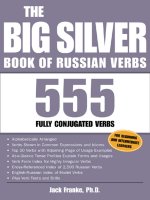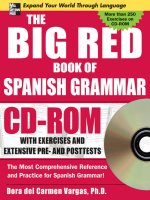the gun digest book of firearms assembly, disassembly [pt. v - shotguns] 2nd ed. - j. wood (dbi, 2002) [ecv] ww
Bạn đang xem bản rút gọn của tài liệu. Xem và tải ngay bản đầy đủ của tài liệu tại đây (36.36 MB, 1,519 trang )
The Gun Digest
Book of
FIREARMS
ASSEMBLY/DISASSEMBLY
Part V: Shotguns
Second Edition
J. B. Wood
Editorial Comments and Suggestions
We're always looking for feedback on our books. Please let us know what you like about this edition. If you
have suggestions for articles you'd like to see in future editions, please contact.
Ken Ramage
700 East State St.
Iola, WI 54990
email:
© 2002
by Krause Publications
Printed in the United States of America.
All rights reserved.
No portion of this publication may be reproduced or transmitted in any form or by any means, electronic or mechan-
ical, including photocopy, recording, or any information storage and retrieval system, without permission in writing from
the publisher, except by a reviewer who may quote brief passages in a critical article or review to be printed in a magazine
or newspaper, or electronically transmitted on radio or television.
Manuscripts, contributions and inquiries, including first class return postage, should be sent to the Book Editorial Of-
fices, Krause Publications, 700 E. State Street, Iola, WI 54990-0001. All materials received will receive reasonable care,
but we will not be responsible for their safe return. Material accepted is subject to our requirements for editing and revi-
sions. Author payment covers all rights and title to the accepted material, including photos, drawings and other illustrations.
Payment is at our current rates.
CAUTION: Technical data presented here, particularly technical data on the handloading and on firearms adjustment
and alteration, inevitably reflects individual experience with particular equipment and components under specific circum-
stances the reader cannot duplicate exactly. Such data presentations therefore should be used for guidance only and with
caution. Krause Publications, Inc., accepts no responsibility for results obtained using this data.
Published by
700 E. State Street • Iola, WI 54990-0001
Telephone: 715/445-2214
Web: www.krause.com
Please call or write for our free catalog of publications. Our toll-free number to place an order or obtain a free catalog is
800-258-0929 or please use our regular business telephone, 715-445-2214.
Library of Congress Catalog Number: 79-54271
ISBN: 0-87349-400-8
eISBN: 978-1-44022-420-1
Introduction
As a general rule, the average shotgunner is likely to know more about simple takedown
than most other shooters. In modem semi-auto and slide-action guns, especially, several ex-
tra barrels in different lengths and choke degrees may be kept on hand and changed fre-
quently. Because of the sometimes-inclement weather conditions in which it is used, the
hunter's shotgun will often need to be taken completely apart, dried and cleaned. Besides the
effects of rain, snow, or dust, there are always a few cases of the gun being inadvertently
dropped over the side of a boat.
When the non-gunsmith is faced with the necessity of total takedown, the original instruc-
tion sheet or booklet supplied with the gun can be of some help, if he has it. Most of these,
though, go only as far as field-stripping. Also, for some of the older guns, these booklets are
scarce and valuable collector items, not usually available to the average gun owner. Some of
the foreign manuals are direct translations, and are sometimes more amusing than helpful.
So, this series of books is designed to help, with clear instructions for complete takedown
and reassembly. The first four volumes have covered pistols, revolvers, rimfire rifles, and
centerfire rifles, in that order. A sixth volume covered law enforcement weapons.
Some points in complete disassembly and reassembly may require the special tools and
skills of a gunsmith. It can usually managed by a very knowledgeable amateur, but there
must be some mechanical aptitude. Since this book is intended for both the amateur and the
professional, even the simpler operations are often described and shown in detail.
In some cases, the tools needed are not available at an ordinary store, so a section on tools
is included, along with the sources for each tool or set of tools.
A few general rules can be applied to the takedown of any gun: A nylon or plastic mallet
may sometimes be used to tap a tight assembly free, but no extreme force should be used.
Wear safety glasses at all times to protect the eyes from springs and spring-propelled parts.
Avoid taking a gun apart in circumstances where small parts are likely to be lost. Finally,
read the instructions through at least once, before you start.
My readers, I assume, are intelligent, and would not try to dismantle a loaded gun. So, I
won't begin each set of instruction with the standard warning. However, since anyone can
have a momentary lapse, I'll say it once: Before starting the takedown of any gun, be sure
it is entirely unloaded. Don't rely on the feed and ejector systems -look inside and make
certain. In some tube-magazine types, a round can "hide."
An important addition to the back of this book is a comprehensive index and cross-ref-
erence list, linking all of the shotguns covered here to guns of similar or identical pattern.
When these are included in the count, the instructions in this revised edition can be used for
the takedown and reassembly of hundreds of shotguns.
J. B. Wood
Raintree House
Corydon, Kentucky
April, 2002
A Note on Reassembly
Most of the shotguns covered in this book can be reassembled by simply reversing
the order of disassembly, carefully replacing the parts in the same manner they were
removed. In a few instances, special instructions are required, and these are listed
with each gun under "Reassembly Tips." In certain cases, reassembly photos are also
provided.
If there are no special instructions or photos with a particular gun, you may as-
sume that it can just be reassembled in reverse order. During disassembly, note the
relationship of all parts and springs, and lay them out on the workbench in the order
they were removed. By following this procedure you should have no difficulty.
The Gun Digest
®
Book of
Firearms Assembly/Disassembly
Part V: Shotguns, 2nd Edition
Contents
Introduction
Tools
Benelli Model 121 M1
Benelli Nova
Beretta Model A303
Browning Auto-5
Browning B-2000
Browning BPS
Browning Superposed
CBC Model 151
EAA Baikal IZH-18
EAA Baikal IZH-27
Essex
Franchi Model 48AL
Franchi S.P.A.S. 12
Harrington & Richardson Topper
High Standard Flite-King
High Standard Supermatic
Ithaca Mag 10
Ithaca Model 37
Iver Johnson Champion
Marlin Model 26
Marlin Model 55
Mossberg Model HS410
Mossberg 395KB
Mossberg Model 500
Mossberg Model 695
Mossberg Model 9200
Parker Double
Remington Model 10
Remington Model 870
Remington Model 11-48
Remington Model 11-87
Remington Model 1100
Ruger Red Label
Savage Model 24D
Savage Model 30
Savage-Stevens Model 311
Savage Model 755A
SKB Model XL900MR
L.C. Smith Double
Smith & Wesson 916
Smith & Wesson 1000
Snake Charmer II
Stevens Hammer Double
Stevens Model 59B
Stevens Model 124C
Stevens Model 520
Stevens Model 9478
Stoeger IGA English
Street Sweeper
Tri-Star Model 411R Coach
Winchester Model 12
Winchester Model 37
Winchester Model 97
Winchester Model 101
Winchester Model 1200
Winchester Model 1400
Winchester Model 1887
Winchester Super-X Model 1
Winchester Super-X Model II
This book is dedicated to my father, James W. Wood.
Acknowledgements
My thanks to these people, who helped to make this book possible:
John S. Yarger, John A. Yarger, James W. Yarger, and Larry McClarney of Lock & Load
Gun Shop; Dr. Kenneth Eblen, A1 Paulsen, Brian Paulsen, Donald L. Harrison, Kenny B.
Woods, James H. Manion, Don Hatten, Bill Risinger, Mel Luton, Mike Burkdoll, and Stan-
ley Hopper; Joe Koziel of Mossberg; Dick Dietz of Remington; George Woford of American
Arms; Tyke Arbaugh and Rafael Aguine of Beretta; Dan Flaherty of Magtech; Phil Hunter
of the Gun Parts Corporation; Larry Sterett; James W. Wood; Terah L. Flaherty, James R.
Blough; Glenn Lancaster; John Huff; Paul Thompson of Browning; Don Madole of Tri-Star;
Keith Bernkrant and Paul Richter of EAA; Jay Langston, Stephen McElvain, and Joe Triani
of Stoeger and Benelli.
Tools
Countless firearms, old and new, bear the marks, burrs, and gouges that are the res-
ult of using the wrong tools for taking them apart. In the interest of preventing this
sort of thing, I am including here a group of tools that are the best types for the dis-
assembly of shotguns. Except for the few shop-made tools for special purposes, all of
those shown here are available from one of these sources.
Brownells Inc.
Route 2, Box 1,
200 S. Front St.
Montezuma, Iowa 50171
B-Square Company
P.O. Box 11281
Fort Worth, Texas 76109
General Instructions:
Screwdrivers: Always be sure the blade of the screwdriver exactly fits the slot in the
screw head, both in thickness and in width. If you don't have one that fits, grind or file the
tip until it does. You may ruin a few screwdrivers, but better them than the screws on a fine
shotgun.
Slave pins: There are several references in this book to slave pins, and some non-gun-
smith readers may not be familiar with the term. A slave pin is simply a short length of rod
stock (in some cases, a section of a nail will do) which is used to keep two parts, or a part
and a spring, together during reassembly. The slave pin must be slightly smaller in diameter
than the hole in the part, so it will push out easily as the original pin is driven in to retain the
part. When making a slave pin, its length should be slightly less than the width of the part in
which it is being used, and the ends of the pin should be rounded or beveled.
Sights: Nearly all dovetail-mounted sights are drifted out toward the right, using a nylon,
aluminum, or brass drift punch.
1. The tiniest of these fine German instrument screw drivers from Brownells is
too small for most gun work, but you'll see the rest of them used frequently
throughout the book. There are many tight places where these will come in
handy.
2. When a larger screwdriver is needed, this set from Brownells covers a wide range
of blade sires and also has Phillips- and Allen-type inserts. The tips are held in
place by a strong magnet, yet are easily changed. These tips are very hard. With
enough force you might manage to break one, but they'll never bend.
3. You should have at least one good pair of bent sharp- nosed pliers. These, from
Brownells, have a box joint and smooth inner faces to help prevent marring.
4. For heavier gripping, these Bernard parallel-jaw pliers from Brownells have
smooth-faced jaw-pieces of unhardened steel to prevent marring of parts.
5. For situations where a non-marring rap is needed, this hammer from Brownells is
ideal. It is shown with nylon faces on the head, but other faces of plastic and
brass are also available. All are easily replaceable.
6. For drifting out pins, these small all-metal hammers from B-Square are the best I've
seen. Two sires (weights) are available and they're well worth the modest cost.
7. For situations where reach and accessibility are beyond the capabilities of sharp-
nosed pliers, a pair of large sharp-nosed forceps (tweezers)will be invaluable.
8. One of the most-used tools in my shop is this nylon tipped drift punch, shown with
an optional brass tip in place on the handle. It has a steel pin inside the nylon tip
for strength. From Brownells, and absolutely essential.
9. A good set of drift punches will prevent a lot of marred pins. These, from
Brownells, are made by Mayhew. The tapered punches at the right are for starting
pins, the others for pushing them through. Two sizes are available-4 inches or 6
inches.
10. These punches by Mayhew are designed specifically for roll pins and have a pro-
jection at the center of the tip to fit the hollow center of a roll pin, driving it out
without deformation of the ends. From Brownells.
11. Some of the necessary tools are easily made in the shop. These non-marring drift
punches were made from three sizes of welder's brazing rod.
12. This firing pin bushing spanner wrench from B-Square adjusts to fit all bushing
holes, from 3/16" to 7/16" spacing. The pins are replaceable.
13. Designed to fit the Winchester Model 12, this forend cap nut wrench from
Brownells is also usable on several other slide-action shotguns.
14. One of three stock wrenches from B-Square, this one is designed especially for
use on the Rernington Model 1100.
15. Conceived by former Gun Digest associate editor, Bob Anderson for B-Square,
this handy tool is designed for pushing out the trigger group retaining cross pins
in the Remington shotguns, and will work on several others. A rubber ring at the
base of the shaft protects the side of the receiver.
16. Another of the B-Squarestock wrenches, this short version is designed especially
for the Remington Model 870, but will work on several other guns.







![the ptsd workbook for teens - simple, effective skills for healing trauma - l. palmer (instant help books, 2012) [ecv] ww](https://media.store123doc.com/images/document/14/y/ml/medium_mlj1399113607.jpg)

